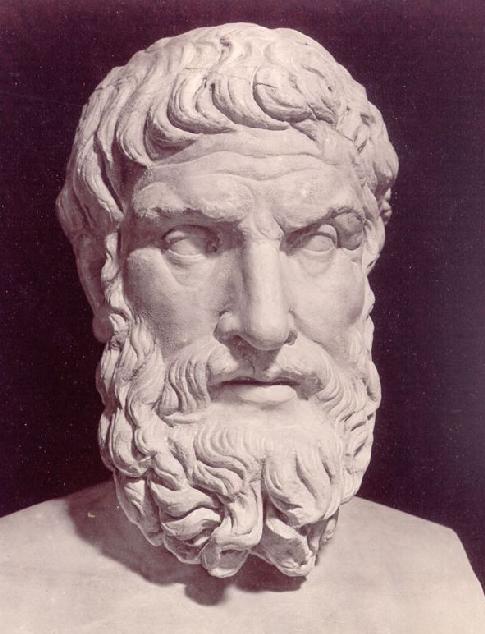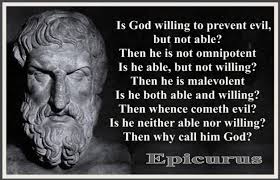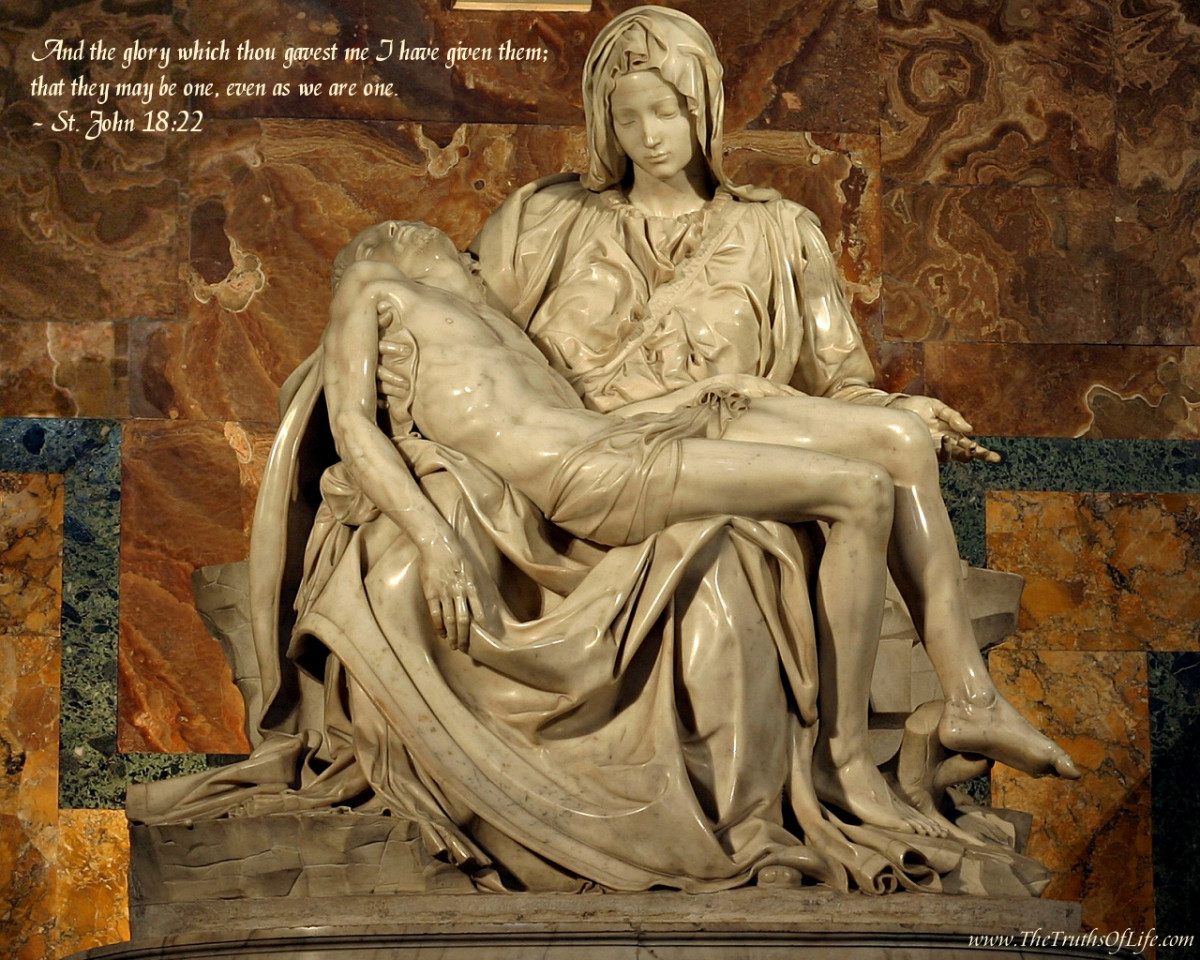Epicurus' "Problem of Evil" - common arguments
Epicurus

The Problem of Evil conundrum has often being used by disbelievers to challenge theists. It is a concept made by Epicurus (341-270BC), an ancient Greek philosopher and the founder of the school of philosophy, Epicureanism.
He did not believe in an after-life. Upon death, the body and soul no longer existed. The gods did not interfere with human affairs. They did not punish nor reward humans. He believed anxiety stemmed from the fear of punishment, which in turn, caused irrational desires. Epicureanism could also be compared to the science of ethics, the precursor of later trends in Western ethics.
Often atheists will use the Epicurus conundrum, which I will highlight further on, as a way to undermine the existence of the Christian God. However, Christian “ethics” proved to be in opposition to the Greek philosophers. Epicurus did not believe in accountability to any god in the form of punishment. Jesus most certainly did preach accountability before God Himself. There were consequences and it was far more than just anxiety. The conduct of a person, according to the Greek philosophers, was due to practical reasoning which would govern their lives. However, Christianity is based on faith. It is not a practical way of living. Of course Christians should take precaution to planning for the future to a certain degree. We have responsibilities, too. However, there comes a time when we can do no more and have to rely on our faith in God to see to our needs. This “Sermon on the Mount” attitude is hard for others to reconcile with. Everything is our responsibility, they say. You can’t just count on God. Christianity requires our conduct to be based on God’s will and not a comprehensive ethical system. The love for God will automatically transform our character in that we will automatically want to be righteous. We do not need, therefore, to have an ethical system. We don’t need an instruction book on how to live.
However, early Christianity did tend to emphasize the reward/punishment card to a great deal. The problem with this is that many early Christians may have become Christian out of fear of punishment or the anticipation of rewards in the after-life. It is not much different today with a lot of Christians. They are not so motivated to serve God out of love but rather what they can get out of it. The Bible does serve to be an instruction book to them which should not be the case. It is the God, Himself, who should instruct us.
In contrast, the Greek philosophers believed that good should be motivated by the happiness received by being virtuous. It will take the fear out of punishment. This actually preaches that there will be no greater punishment for moral wrong doing other than an uneasy conscience.
So we can see that the Epicurus conundrum was obviously not about the Christian God because he lived before Christ. However, it is an argument against a god being moral and interested in mankind’s affairs.
"The Problem with Evil" conundrum

People underestimate the power of Satan. His powers were not given to him by God. If it wasn't for Jesus, Satan would be the more powerful one to take our souls. Yes, He is willing to prevent evil but humanity has chosen to do Satan's will. They have actually given the power to Satan and have taken it away from God. If one truly loves Christ, however, God is unstoppable.
By asking God to prevent evil, it's like following your child everywhere and making sure he/she doesn't make decisions on his own lest he does something evil. It's like asking a child to be put into a glass box. If God did that, He’d be considered a tyrant. To make us into robots so we can't do evil. If He does give us free will, then He suddenly is responsible for the evil because He could have prevented it. God is always the bad guy.
Is God willing and able to prevent evil? To stop that, He'd have to put us all in a box so we can't choose. He can do that but would you be happy about that? It is humanity that has chosen to serve Satan. Therefore God cannot prevent evil in this world when we are responsible for it.
The question of, "Why call Him God?" is due to a complete lack of understanding about who God is.
Common arguments about the problem of evil
Why, if God cares about us, are there horrendous things happening on earth like disease, starvation, nature disasters, etc?
It is not only God who has had a hand in creation. Contrary to Christian beliefs, however, Satan has had also.
But why does God above watching us and doing nothing to save us?
People assume that God just looks on and does nothing. He works through people who respond to Him to help alleviate suffering. In the lives of those who love Him, He is far from looking down at us. I know this from experience. It doesn't mean I'm exempt from suffering but I know that when I do, it is because there is a reason for it. It refines me as a person.
Most importantly, we know that God sent His only Son on earth to save us. Not only that, but to share our suffering. Many people cannot identify with a god who doesn't know what it is like to be human. We could turn around and say, "But it's easy for You because you have never been human." This could be a Muslim or Jewish argument. However, we cannot accuse the Holy Father of not knowing what it is like to be human.
God uses suffering to punish us for being fallen beings
That is simply not true. There are innocent people who would suffer from this punishment. This concept comes from the Noah's Ark story where a flood drowned the whole world, regardless of the innocent, because of the evil in the world. Using suffering to punish us is an act of the gods if one researches the pagan stories. One example is the flood story from the Sumerian tablets. The Sumerians were one of the earliest civilizations existing from 3500-1750 BC)
In the Sumerian creation story, the reason why the gods sent the flood is because mankind was making much too much noise much to the ire of the chief God Enlil. He could not sleep. The goddesses Nintur and Inanna were deeply aggrieved at the thought of the doomed people but Enki, the brother of Enlil, contacted the priest-king, Ziusudra to warn him. Enki speaks to the king through a wall, carefully trying to avoid coming to light that he was breaking an oath not to alert the people. He says to Ziusudra that the gods have commanded that a flood sweep over the cult centres and destroy the seed of mankind. Enki advices Ziusudra how to build a boat and fill it with living creatures.
And, unfortunately, those vengeance characteristics of the gods have been transferred onto the Father of Jesus, which is fallacious.
God uses individual suffering to bring them closing to Him. Are there no other ways to do so than cause suffering?
There's a difference between using suffering and actually being the cause of it. He doesn't take anyone's child away from them. He doesn't cause tornadoes and the lot. However, suffering can spiritually refine a person. I was watching a documentary on a devastating earthquake. One said He didn't realize what life was about until he lost everything. Family to him is the most important thing. In the past, it was about him. Now it is about others. If Jesus had not suffered on earth, none of us would be saved. He would be looking out for His own interests and not the people. If one has not suffered, they cannot have compassion because compassion comes from identifying with another's suffering.
Who are we to question God about evil and suffering in the world? He is God and cannot suffer Himself any real loss. His Son died, resurrected after three days and is now reigning with the Father. People go through far worse things than crucifixion.
God prefers someone to ask, "Why did you allow this person to suffer?" rather than, "Thank God it's not me who is suffering." The latter question is indicative of someone who cares. God is the one who suffers the most. The cross was easy comparable to the hell He went through. It was not a case of dying and then going to heaven. He descended into hell to take on all the evil and suffering in the world. No one could endure that sort of suffering. And even though Jesus is reunited with the Father now, His suffering has not stopped. He shares in our suffering.
It is abhorrent of God to use suffering for His own glory.
It's not about using suffering so that God can have all the glory. It is about using suffering to spiritually refine us to make us better people. What kind of people would we be if we never suffered? Shallow and self centred and those are the people we don't respect.
Why does God allow suffering in the first place? If He is the only one omnipotent, then He must be responsible for all the evil in the world? He gives evil permission.
Why should God be held accountable for people choose to do? They are the ones who are allowing suffering by handing over power to Satan. Why is God always the one responsible? Why is Satan always off the hook? Why did God allow Jesus to die? It was permissive will from the free will of other people.
Why does God love us? Can He choice to or not to? Is it in His nature to love us? Therefore if He cannot stop loving us then His is powerless against His omnipotence. So if He is omnipotent, why doesn't He do something about it?
That's like asking a parent why they love their child. We are His children. Of course He is going to love us. His love for humanity will never cease. I could put out that a lot of things like plagues and typhoons are man-made. Some create diseases in a lab to cull the population. Others use HAARP technology to manipulate the weather. In others words, people must just stop blaming God for everything. And God has done something about evil. He sent His only son for our sins.
Why doesn't God remove the sinful nature of man if He is so omnipotent? That is no violation of free will but Adam and Eve did not have knowledge of evil but Christians believe they had no free will. There will angels who did not rebel against with their free will but they had no corrupted natures. They were perfect.
I tend to lean against monotheism and more towards dualism. As a monotheistic God, He should not have let evil in the world in the first place if He had the power. So what is dualism?
In religion, dualism means the belief in two supreme opposed powers or gods, or sets of divine or demonic beings, that caused the world to exist. In others words, God does not have omnipotence when it comes to this world. Satan has the power to rule as well and he has the most power because humanity has chosen sin.
It is in our DNA. Human beings have been manipulated to have the propensity to do evil. It is not God who created us like this but Satan who corrupted us. Perfect beings do not have the desire to do evil. The Adam and Eve story is not literal and the angels did not rebel in heaven. How could they if they were sinless? If evil does not exist in heaven, how did Lucifer get an evil thought in the first place?
According to Sumerian Tablets, upon which Genesis is based, Adam and Eve were the first genetically modified man by extra-terrestrials. That is why they had the desire to do evil.
What does natural disasters have to do with free will that led to man's fallen nature? Why doesn't God stop a murderer? Why is the free will of the murderer more important than the victim's?
Did you know that if God had to prevent this murder, He'd have to prevent all sin? In other words, if He just killed that murderer, we would have to be, too, to stop evil since we are the enablers? Where would it stop? How would the world function if everyone just dropped dead? Then you could say God respected the free will of those who put Jesus to death more than His own Son's free will.
Why did God violate the free will of the Apostle Paul to witness for Him? Paul would not have chosen to serve Jesus if his free will wasn't violated.
From the day we are born, God knows who would be receptive to Him. So even though it feels like a violation of free will, God knew that those people would want to do His will. He wouldn't choose anyone who would go against His will.
Is God teaming up with Satan to achieve a certain goal? That would make Him malevolent.
God is not working with Satan. However, He can use evil for good. He didn't want it in the first place, but we know that much good can come out of suffering.
Is God rather using Satan's control of the earth to achieve His own goals? Can't He achieve His will without using suffering?
Without people to cause suffering by giving Satan power, God would not have had to fight Satan at all and even have the goal to defeat Him. There is a constant battle between good and evil. It's not a case of God needing Satan to achieve His own goals. The problem with this whole argument is that Satan and human beings are seen not to have any responsibility whatsoever. It's all God's fault. Without Jesus' suffering, God's goal of saving humanity would never have been achieved.
Why did God create Satan in the first place? Why did God create hell for us to be tormented in?
God did not create Satan. That is an erroneous Christian belief that actually comes from the Sumerian pagan creation story. It is nowhere in the Bible that Lucifer was created by God or that there was a rebellion in heaven. There is no record that Lucifer wanted to be like God. The only thing that alludes to Satan being a creation of God is in Genesis where it says the serpent is the most cunning creature that God made. It does not say that serpent is Satan or Lucifer. The Sumerian story says the Sumerian God, Enlil, is the creator of the Garden of Eden. He is the oppressive god. His brother, Enki, who created mankind, was the liberator of mankind. Enki gave mankind knowledge to mix human genes with the Annunaki. This enraged Enlil because mankind was becoming more god-like like the Annunaki. Enki was a serpent god. In Gnosticism, Enlil, the oppressive God was Yahweh in the Bible. Enki, the serpent in the Garden of Eden, was the liberator of mankind. The serpent represents healing and wisdom.
Enlil attempted to tarnish Enki's reputation by saying the serpent was evil. It bled into the Genesis story. We see threads of the serpent being good even in the Bible. Numbers 2:9 alludes to this:
"So Moses made a bronze snake and put it up on a pole. Then when anyone was bitten by a snake and looked at the bronze snake, they lived."
We know that Moses turned sticks into snakes. He also erected a brazen serpent for the Israelites to worship. 2 Kings 18:4
"He removed the high places, smashed the sacred stones and cut down the Asherah poles. He broke into pieces the bronze snake Moses had made, for up to that time the Israelites had been burning incense to it. (It was called Nehushtan.)"
This totally negates the claim that the serpent was Satan in Genesis.
God did not create hell. It is merely a complete separation from God. It is the absence of God. So it is not a flaming place where people go.








